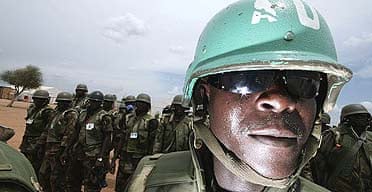Gordon Brown scored a dramatic first foreign policy victory tonight when the UN security council voted to deploy a 26,000-strong international force to Darfur with a tough mandate to stop the massacres of civilians that have driven 2 million people from their homes.
Mr Brown has made Darfur a foreign policy priority and the UN resolution was an Anglo-French initiative he promoted 10 days earlier, with the French president, Nicolas Sarkozy, aiming to end a year of international drift on the issue. Earlier this week, he secured President Bush's support for the draft UN resolution.
The unanimous vote was passed after China, the Sudanese government's main defender at the UN, dropped its objections. British officials said that China's oil interests in Sudan were eventually outweighed by anxiety about a possible international human rights backlash over Darfur aimed at next year's Olympic games in Beijing.
The UN vote will dispatch a hybrid force of 19,555 UN and African Union (AU) soldiers and more than 6000 police officers from around the world. They are due to take over from a largely ineffectual 7,000-strong AU force in the western Sudanese region by the end of the year, and they will have a much more muscular mandate.
They are being deployed under chapter seven of the UN charter, which will give them the right to use force to protect civilians and carry out the mission of assisting the delivery of relief supplies.
The UN secretary general, Ban Ki-moon, called the decision a "historic and unprecedented resolution" that will send "a clear and powerful signal" of the UN's commitment to "close this tragic chapter in Sudan's history." Britain's ambassador to the UN, Emyr Jones Parry, called it "an unprecedented undertaking in scale, complexity and importance".
Hours before the vote, Mr Brown went to the UN headquarters to endorse the resolution in person, describing Darfur as "the greatest humanitarian disaster the world faces today".
Since a rebellion broke out in the province in 2003, the fighting has cost the lives of over 200,000 people, most at the hands of Arab militias, known as the Janjaweed, sponsored by Khartoum.
About 2 million people have been forced from the villages into relief camps in Darfur and over the border in Chad, where the conflict has shown signs of spreading. A total of 4 million people in Darfur depend on food aid to survive.
Mr Brown also used his UN visit to scold the world's industrialised nations, which he said were "a million miles" from the UN's Millennium Development Goals, which include the aim of halving extreme global poverty by 2015.
The security council voted while Mr Brown was flying back from his maiden US trip as prime minister, which his aides claim has been an outstanding success. At Camp David, the prime minister reaffirmed his support for the transatlantic alliance but stopped short of the warm personal endorsements of President Bush that Tony Blair had been known for.
A Washington Post headline on the meeting described the British prime minister as "More Bulldog than Poodle".
Human rights activists welcomed last night's vote, but warned that a lot more political will would be needed to ensure the security council decision was implemented in the face of potential obstructionist tactics by Khartoum, which had referred to similar versions of the resolution as "ugly" and "awful".
The resolution had been stripped of any threat of sanctions against the Sudanese government if it blocked the force's deployment though Mr Brown said his government would "redouble" efforts to impose an embargo if that happened.
"It is not time...to pop open the champagne bottles. The true test of this measure is not what happens today in New York, but what happens over the coming weeks in Darfur," Allyn Brooks-LaSure of the Save Darfur Coalition said tonight.
Bernard Kouchner, the French foreign minister, pledged that the political momentum would be maintained, calling for a rapid deployment of the force "in conditions that allow it to 'make a difference".
Most of the troops will come from African countries, with Nigeria, Uganda and Rwanda among the major contributors, but elements will come from around the world, including a team of Chinese engineers who will build the base.
Although Britain tabled the resolution, Mr Brown's aides said Britain would contribute only a handful of troops, but provide as much as £100m in logistical and economic support.
The new resolution is intended to give fresh momentum to peace talks between the Khartoum government and a range of rebel groups including the Sudan Liberation Movement and the Justice and Equality Movement.
The groups have been internally divided, but the UN's Darfur envoy, Jan Eliasson, and his African Union counterpart, Salim Ahmed Salim, will encourage them to come up with a common platform at a meeting starting on Friday in Arusha, Tanzania.
